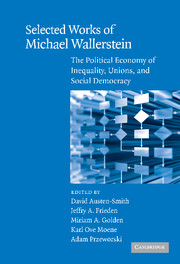 Selected Works of Michael Wallerstein
Selected Works of Michael Wallerstein Published online by Cambridge University Press: 27 January 2010
Empirical work on trade unions and organized labor in advanced nations underwent a resurgence beginning in the 1970s. The initial impetus was twofold: first, the strike wave that in the closing years of the 1960s swept across the European countries – most markedly France and Italy, but elsewhere as well (Crouch and Pizzorno 1978) – and second, the growing recognition in the years following the first oil shock in the winter of 1973 that wage militancy was a potentially important factor affecting inflation, unemployment, and ultimately economic growth (Bruno and Sachs 1985; Olson 1982). These two sets of events sparked new interest in problems of comparative trade unions, industrial relations, and wage militancy, problems that had lain largely outside the purview of political science in the preceding decades. Unions were now seen as political organizations, both in the sense that their internal organization exhibited political features and in the sense that their activities carried with them consequences of significance for the political realm.
This part includes four of Michael Wallerstein's most important contributions to the study of trade unions in advanced industrial economies. Although the papers display a range of analytic strategies, they are all concerned with understanding variations in union strength and organization, as well as the possible effects of these variations on wage outcomes. A central thread connecting all four essays concerns the centralization of collective bargaining, a core topic of Wallerstein's (1985) doctoral dissertation, to which he returned many times thereafter.
To save this book to your Kindle, first ensure [email protected] is added to your Approved Personal Document E-mail List under your Personal Document Settings on the Manage Your Content and Devices page of your Amazon account. Then enter the ‘name’ part of your Kindle email address below. Find out more about saving to your Kindle.
Note you can select to save to either the @free.kindle.com or @kindle.com variations. ‘@free.kindle.com’ emails are free but can only be saved to your device when it is connected to wi-fi. ‘@kindle.com’ emails can be delivered even when you are not connected to wi-fi, but note that service fees apply.
Find out more about the Kindle Personal Document Service.
To save content items to your account, please confirm that you agree to abide by our usage policies. If this is the first time you use this feature, you will be asked to authorise Cambridge Core to connect with your account. Find out more about saving content to Dropbox.
To save content items to your account, please confirm that you agree to abide by our usage policies. If this is the first time you use this feature, you will be asked to authorise Cambridge Core to connect with your account. Find out more about saving content to Google Drive.